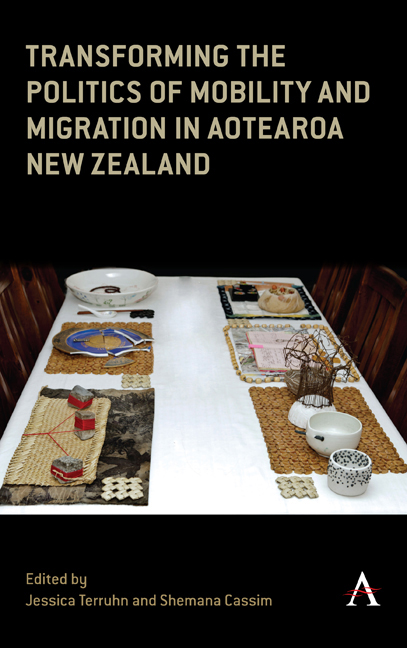Book contents
- Frontmatter
- Contents
- Acknowledgements
- Contributors
- Glossary of Te Reo Māori Words
- Glossary of Te Reo Māori Place Names
- Glossary of Other Non-English Words
- List of Tables
- List of Figures
- Introduction: Reimagining the Politics of Mobility and Migration Through Decolonisation, Social Justice and Solidarities
- Cover Artwork: A Place at the Kauri Table Revisited … 2021
- Part One Decolonising the Politics of Migration
- Part Two Humanising the Politics of Transnational Mobility
- Part Three Building Solidarities for Migrant Rights and Belonging
- Conclusion: Towards Transforming the Politics of Mobility and Migration in Aotearoa New Zealand
- Index
Ten - Activist Citizenship and Migrant Rights in Aotearoa/New Zealand
Published online by Cambridge University Press: 28 February 2024
- Frontmatter
- Contents
- Acknowledgements
- Contributors
- Glossary of Te Reo Māori Words
- Glossary of Te Reo Māori Place Names
- Glossary of Other Non-English Words
- List of Tables
- List of Figures
- Introduction: Reimagining the Politics of Mobility and Migration Through Decolonisation, Social Justice and Solidarities
- Cover Artwork: A Place at the Kauri Table Revisited … 2021
- Part One Decolonising the Politics of Migration
- Part Two Humanising the Politics of Transnational Mobility
- Part Three Building Solidarities for Migrant Rights and Belonging
- Conclusion: Towards Transforming the Politics of Mobility and Migration in Aotearoa New Zealand
- Index
Summary
Introduction
On 13 May 2021, hundreds of migrants on temporary visas and their supporters gathered in front of the Parliament in Te-Whanganui-a-Tara Wellington to protest the country's migration policies during the Covid-19 outbreak. In the beginning of 2020, Aotearoa/New Zealand introduced one of the strictest border closure regimes in the world to address the pandemic. It stopped processing visas for offshore migrants and severely limited the entry of migrants who already possessed work visas to only allow a few migrants deemed to be conducting essential work (Henrickson 2020). Temporarily, the New Zealand Government, similar to Australia, even introduced a number of travel bans for returning citizens and residents from particular countries, such as India (Jefferies, McAdam and Pillai 2022). Many of the individuals protesting at the Parliament experienced job losses, separation from their families, lack of access to unemployment benefits and long delays in residency applications, and, therefore, urged the incumbent Labour Government to act. One of the organisers of this rally, the Federation of Aotearoa Migrants, asked the Government to process residency visas for those on temporary work visas who would normally be eligible for residency and demanded phased re-entry of people stuck overseas. Other participants of the rally expressed that the Government's decision to freeze residency applications put them in limbo – for example, by preventing them from purchasing a home and applying for a credit card – and that they were living ‘an empty and meaningless life’ without their family members who remained overseas unable to return to Aotearoa/New Zealand (Radio New Zealand 2021).
The then Immigration Minister Kris Faafoi listened to the crowd's concerns with full attention yet responded with a disappointing message: ‘I can’t, today, bring you the news that you want to hear. … We are acutely aware of the disruption that this is causing’ (Wade 2021). The protesters interrupted the minister's speech with shouts of ‘Shame’ and ‘Not good enough!’ This rally was part of a wave of activism (including protests, petitions and collaborations launched by different migrant support organisations) that began when pandemic-related mobility restrictions exposed the precarity of temporary visa holders in Aotearoa/New Zealand. The day before this demonstration, hundreds had held similar protests in Auckland, Christchurch, Hamilton and Queenstown. The Government's temporary ban on travel for those travelling from India in April 2021 also caused backlash among Aotearoa/New Zealand's substantial migrant population (Peters 2021).
- Type
- Chapter
- Information
- Publisher: Anthem PressPrint publication year: 2023

